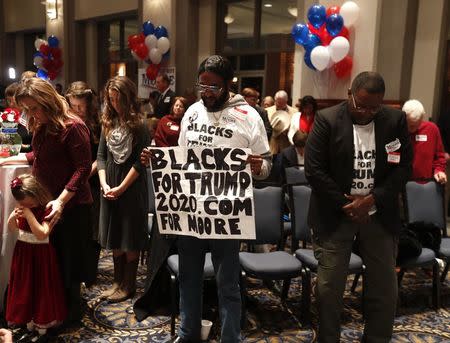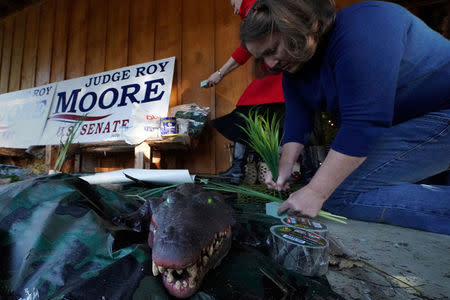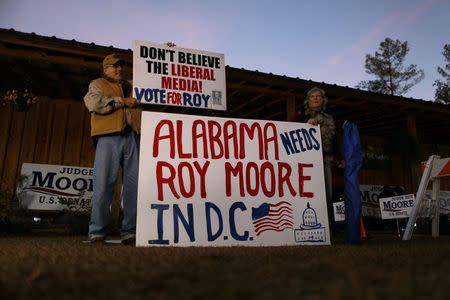Republican Moore embraces Trump message on eve of Alabama election
By Andy Sullivan
BIRMINGHAM, Ala. (Reuters) - Dogged by accusations of sexual misconduct toward teenagers, Republican U.S. Senate candidate Roy Moore cast himself as a staunch ally of President Donald Trump at a rally on the eve of Tuesday's election in Alabama.
Despite Trump's endorsement for Moore, some polls suggest Democrat Doug Jones, 63, a former U.S. attorney, could pull off an upset victory by becoming the first non-Republican to be sent to the Senate by deeply conservative Alabama in two decades.
Steve Bannon, Trump's former chief strategist and executive at the right-wing Breitbart News site, joined Moore in Midland City for the Monday night rally, labeled a "Drain the Swamp" event, in an echo of Trump's 2016 campaign pledge to get rid of Washington insiders.
“I want to make America great again with President Trump," Moore said. "I want America great, but I want America good, and she can’t be good until we go back to God.”
Moore, a 70-year-old conservative Christian and former Alabama Supreme Court chief justice, has been accused by several women of pursuing them when they were teenagers and he was in his 30s, including one woman who said he tried to initiate sexual contact with her when she was 14.
Moore has denied any misconduct. Reuters has not independently verified any of the accusations.
The Alabama race has divided Trump's Republican Party.
The sexual misconduct accusations prompted many senior Republicans, including Senate Majority Leader Mitch McConnell, to distance themselves from Moore.
"There’s a special place in hell for Republicans who should know better,” Bannon told the rally, framing the Alabama election as a showdown between establishment elites and populist power.
A Fox News Poll conducted on Thursday and released on Monday put Jones ahead of Moore, with Jones potentially taking 50 percent of the vote and Moore 40 percent. Fox said 8 percent of voters were undecided and 2 percent supported another candidate.
An average of recent polls by the RealClearPolitics website showed Moore ahead by a slight margin of 2.2 percentage points.
Trump taped a "robo-call" that the campaign has rolled out urging voters to back the Republican candidate in order to help support the president's agenda.
Democrats also made robo-calls using two of their party's own big guns - former President Barack Obama and former Vice President Joe Biden.
'RIGHT SIDE OF HISTORY'
Jones has said he wanted to be a "voice for reason" for Alabama and has touted a record that includes prosecuting former Ku Klux Klan members responsible for the 1963 bombing of a black church in Birmingham in which four girls were killed.
Jones has spent the past week rallying African-Americans, the most reliably Democratic voters in the state, and hammering Moore in television ads. He has told supporters that his campaign is a chance to be on the "right side of history for the state of Alabama."
If Jones wins on Tuesday, Republicans would control the Senate by a slim 51-49 margin, giving Democrats much-needed momentum ahead of the November 2018 congressional elections, when control of both chambers of Congress will be at stake.
Moore's campaign has cast Jones as a liberal out of step with Alabama voters, seizing on the Democrat's support of abortion rights.
Many Republican officials in Alabama, including Governor Kay Ivey, say they will vote for Moore. But the state’s senior Republican senator, Richard Shelby, said he did not vote for Moore and instead backed a write-in candidate on his absentee ballot, telling CNN that Alabama "deserves better" than Moore.
Moore, who was twice removed from the state Supreme Court for refusing to abide by federal law, may find a chilly reception in Washington if he wins. Republican leaders have said
Moore could face an ethics investigation if Alabama voters send him to the U.S. Senate.
Democrats have signaled they may use Moore’s election to tar Republicans as insensitive to women’s concerns at a time when allegations of sexual harassment have caused many prominent men working in politics, entertainment, media and business to lose their jobs.
(Additional reporting by Julia Harte and Lisa Lambert in Washington; Editing by Caren Bohan, Peter Cooney & Simon Cameron-Moore)









